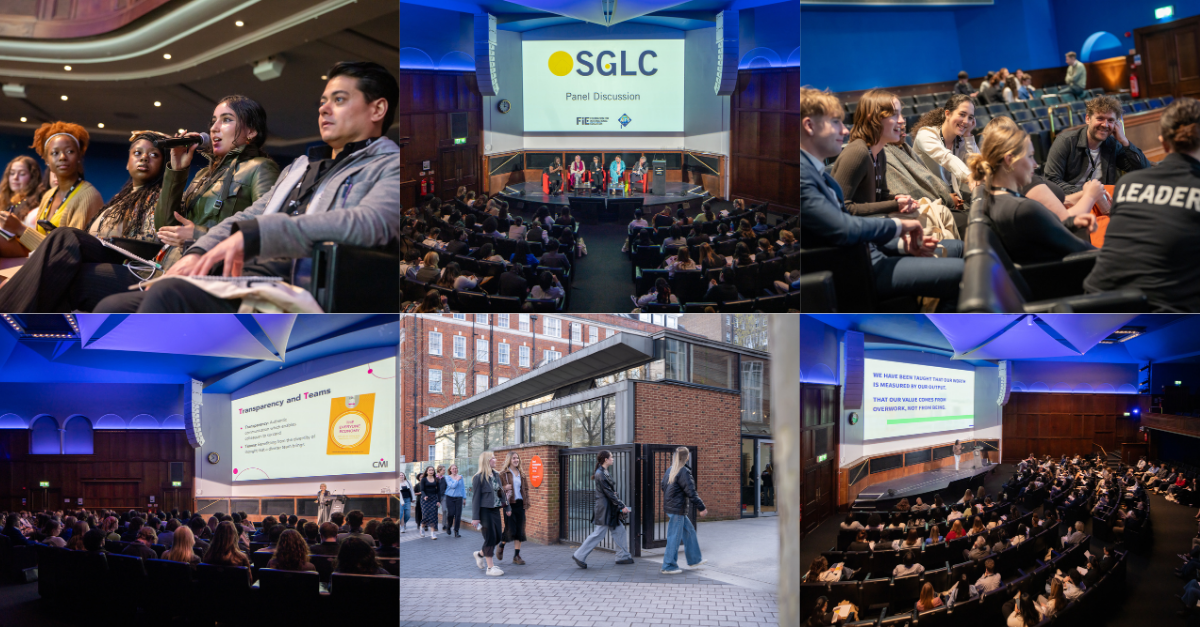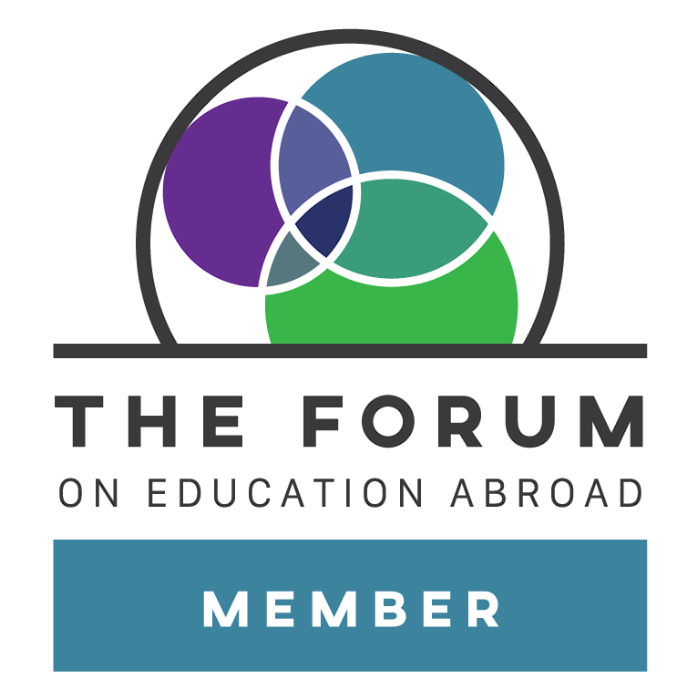“I came here looking for answers. I'm leaving with better questions."
That was how one delegate summed up their time at the Student Global Leadership Conference (SGLC) 2025, and it’s hard to think of a better description. Because while, there were keynote speakers, breakout rooms, panel discussions and poster sessions over two days at the Royal Geographical Society in London. It was so much more than any of that, SGLC felt like a shift – not just in the way people talked about leadership, but in how they experienced it.
This wasn’t leadership in the abstract. It wasn’t about titles, roles or polished résumés. It was leadership rooted in identity, challenge, collaboration and care.
Held on 4-5 April 2025, this year’s SGLC brought together over 200 students, educators, and change makers from across the UK, US and beyond. Delegates represented more than 40 institutions and arrived in London with a shared curiosity: What does it mean to lead in a world that’s unequal, complex and constantly changing?
Over two energising days, through a mix of personal stories, academic insight and cultural exchange, that question developed not into easy answers, but into better, deeper questions.
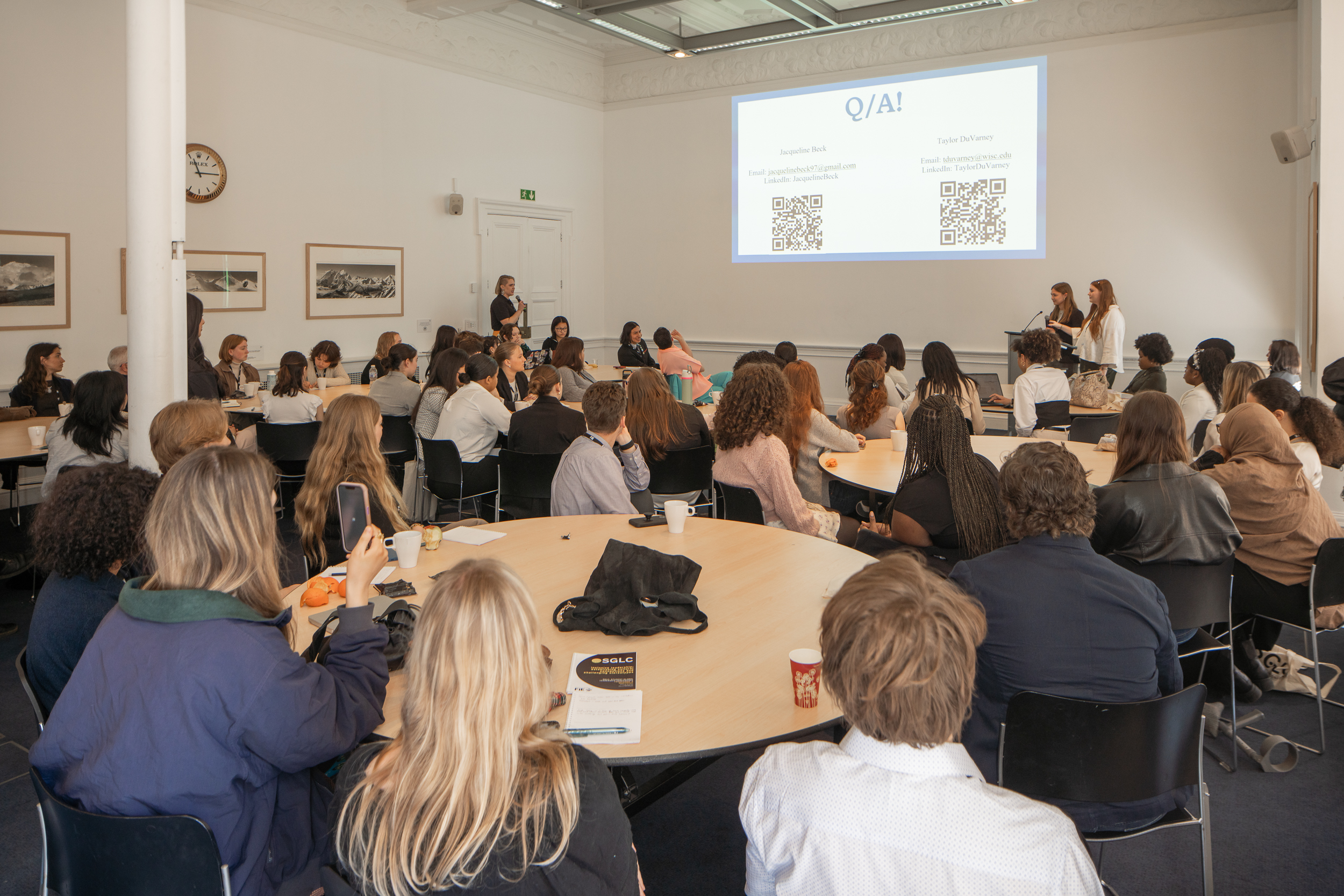
SGLC’s 2025 Theme: Inclusive Leadership: Establishing Cultural Connections and Challenging Stereotypes
Every year, the SGLC theme sets the tone. But this year, the theme didn’t just guide the agenda. It inspired the entire atmosphere.
Rather than approaching inclusion as a checkbox or buzzword, SGLC 2025 asked students to think about inclusion as a practice – something that shows up in how we listen, how we respond, who we make space for, and what assumptions we’re willing to challenge.
What made this powerful was that it wasn’t just delivered by speakers – it was demonstrated through every part of the programme. Students weren’t just attending. They were presenting. They were leading. And they were shaping the very definition of what inclusive leadership could be.
Setting the Stage
SGLC doesn’t build up to a single “aha” moment. Instead, it creates momentum through moments of conversation, connection, and courage. That momentum began on Friday evening with a keynote that invited delegates to rethink what leadership means in today’s complex world.
Ann Francke OBE: Leading in Uncertainty
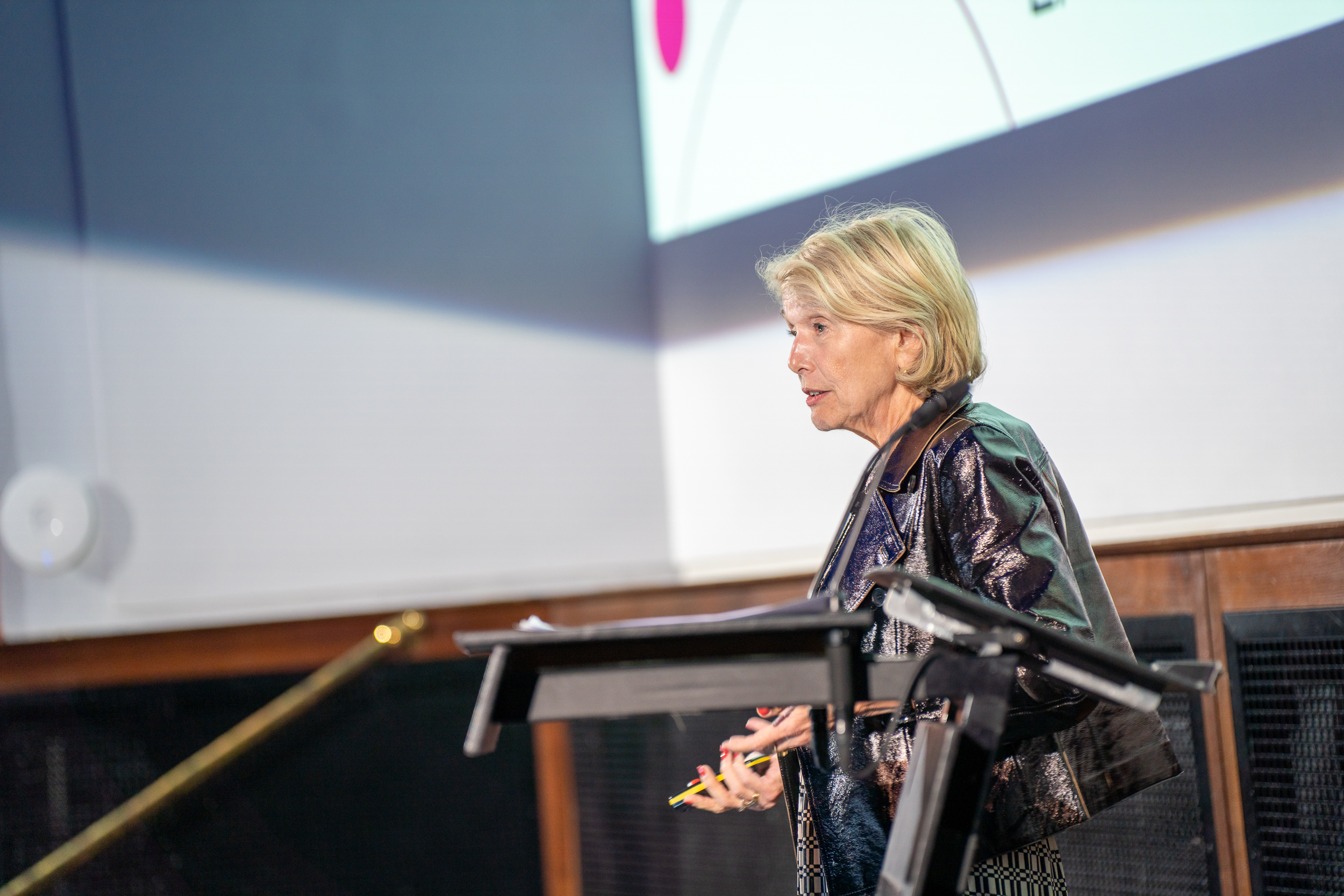
The conference’s first keynote speaker, Ann Francke OBE, Chief Executive of the Chartered Management Institute, offered a perspective that felt both timely and grounded. Her talk, “Leading in an Age of Uncertainty,” addressed the instability shaping workplaces and institutions, from rapid automation and global crises to generational shifts in values and culture.
“There is a spectrum of working cultures,” she said. “And you all have a choice about the one you want to be part of.”
Francke encouraged students to think about leadership as more than authority, to see it as culture-shaping. In the face of disruption, she argued, the most resilient leaders are those who centre empathy, adaptability and ethics.
It was a keynote that didn’t pretend to have all the answers. Instead, it posed an invitation: to navigate uncertainty not with fear, but with curiosity and integrity.
The talk sparked deep reflections among students, many of whom are preparing to enter the workforce in industries that are still redefining themselves. For them, it wasn’t just a speech. It was a mirror held up to their own questions about the future.
Ngozi Cadmus: Why Global Majority Leaders Must Rest from Systemic Oppression
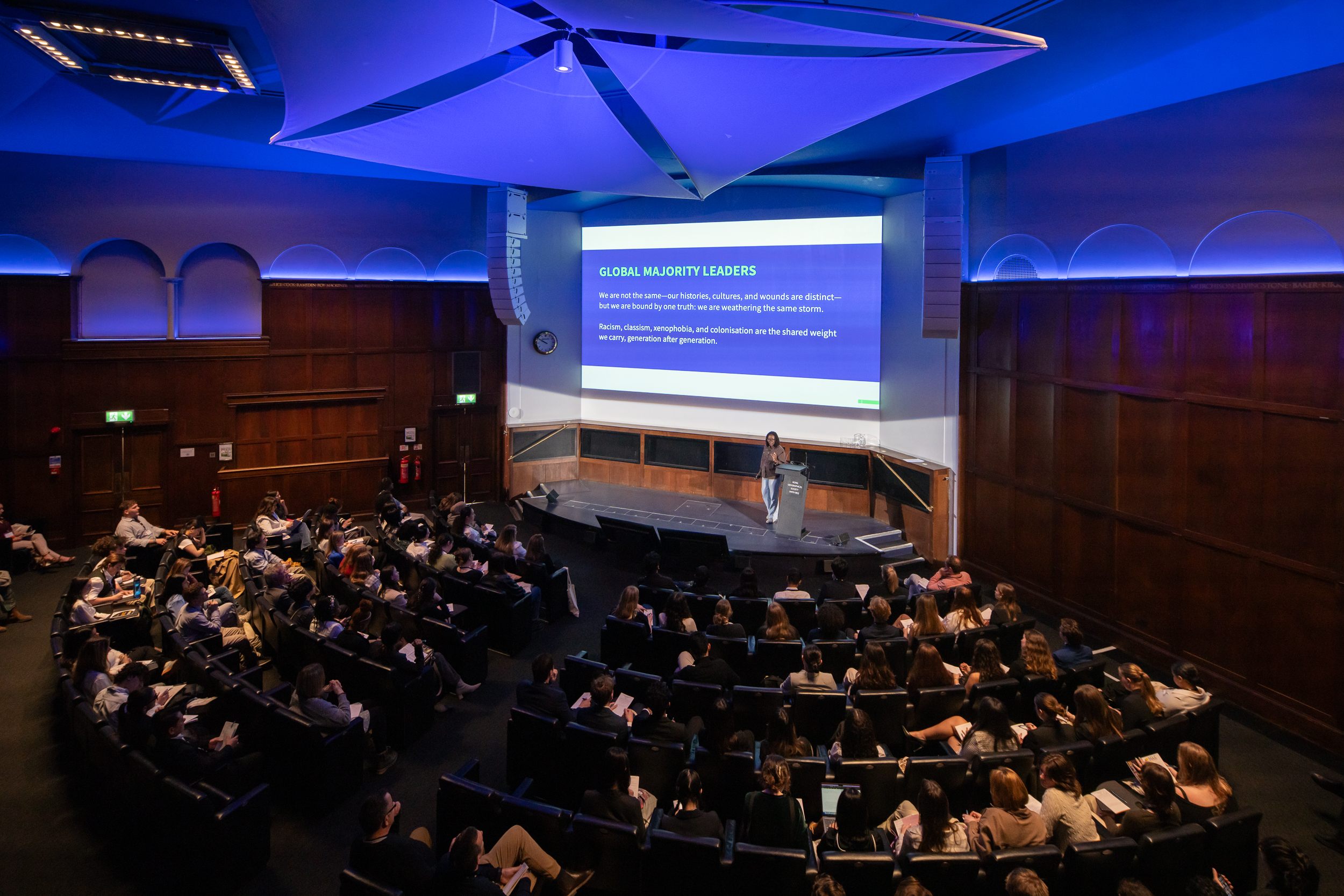
If Francke’s keynote set the stage for strategic thinking, Saturday’s keynote went straight to the heart.
Ngozi Cadmus, CEO of the leading anti-racist and culturally sensitive workplace mental health platform, Happiworkers and the founder of The Black Woman's Rest Revolution, delivered a powerful session titled “Why Global Majority Leaders Must Rest from Systemic Oppression.”
In a world that rewards burnout and over-performance, especially among students and professionals from marginalised backgrounds, Cadmus made a bold argument: rest is not laziness – it’s leadership.“Rest is how we remember who we are behind the grind,” she said. “We cannot dismantle oppressive systems on depleted spirits.”
Her message resonated across the room. Delegates didn’t just hear her words; they felt them.
"I gained a deeper understanding of what rest truly means – not just physical rest, but emotional and mental renewal. It changed the way I think about my future," one attendee shared in the post-event survey.
Cadmus’ session reminded everyone that leadership is not just about output. It’s about preservation, reflection and sustainability. Her words brought the concept of inclusion full circle, showing that it begins within.
Student Presentations and Breakout Sessions
While keynote speakers helped frame the weekend’s big questions, the breakout sessions showcased a rich blend of voices – from experienced educators and professionals to emerging student leaders. These sessions invited delegates to explore inclusive leadership through lived experience, research, and cross-cultural dialogue.
The range was wide and meaningful. Topics included “Breaking Barriers: Inclusive Leadership for Leaders with Unseen Disabilities” by Dr. René Hernandez and Teena Hiebner; “Educating the Whole Child” by Kellie Mowll; “I, LEADER” by Dr. Fatos Selita; and sessions on intercommunal dialogue and ethical decision-making led by Ciaran Casey and FIE Ethical Leadership students.
At the same time, student groups from institutions like Marist University, Drexel, University of Wisconsin, Christopher Newport University, and AIFS brought powerful perspectives on women in leadership, cultural intelligence, voluntourism, and the ethics of representation.
“The presentations weren’t just informative – they were raw, personal, and incredibly powerful,” shared one attendee. “You could feel the passion behind every word.”
Each room carried its own energy. Some sessions leaned academic, others deeply personal – but all were united by a commitment to inclusion, reflection, and action.
The Poster Session
New to SGLC this year was the Poster Presentation Session, where students showcased independent projects and research on leadership, inclusion, and global citizenship.
The session featured a diverse range of themes, including inclusive education systems, DEI strategies across global institutions, sustainability, and the intersections of culture, ethics, and leadership. Presenters used a variety of creative and visual formats, from storyboards and data visualisations to reflective summaries, that sparked meaningful dialogue, enhanced accessibility and encouraged deeper understanding.
It became clear that inclusive leadership isn’t confined to words spoken on a stage. It’s written into the ideas, questions, and investigations these students brought forward.
The Panel Discussion: Inclusion in Practice
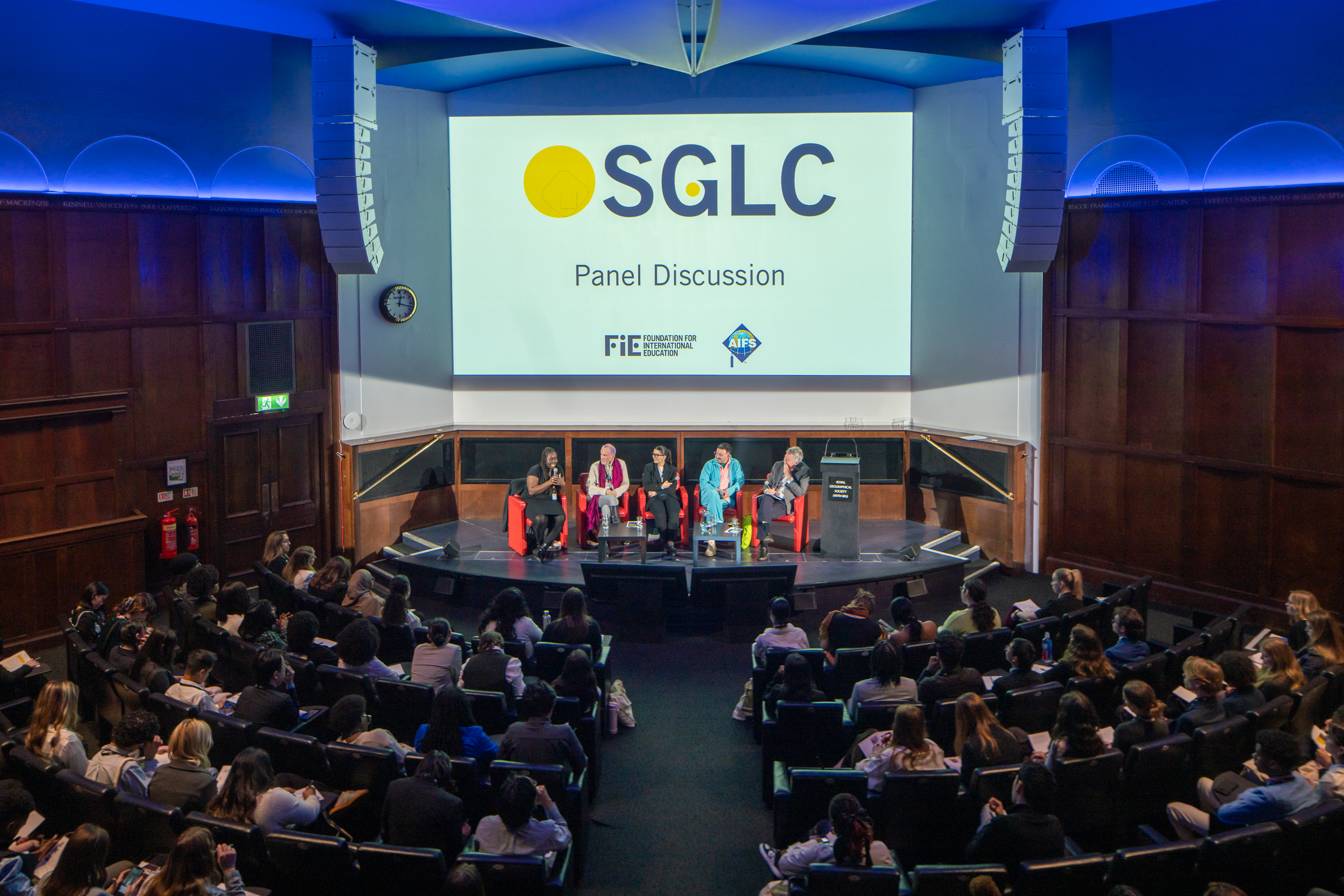
Saturday also featured a Panel Discussion that brought together academic and professional leaders to discuss how to put inclusion into practice in institutions and communities.
The conversation was dynamic, rooted in real-world application. Speakers reflected on the policies, mindsets, and cultural shifts needed to make leadership more equitable and accountable.
“Inclusion isn’t an optional add-on,” said one panellist. “It’s a redefinition of how leadership operates – and it has to be embedded in everything from hiring to curriculum.”
Panellists were asked hard questions, and they answered them with honesty and humility It was less about presenting a perfect picture and more about showing how work in progress can still be transformative.
The audience left not just informed but equipped.
Story Circles: The Quiet Power of Listening
The closing session of the conference took a different form. Rather than ending with a final speech or formal send-off, delegates came together in Story Circles – small, intentional groups designed to reflect, respond, and listen deeply.
These circles created space for students to share insights, process their experiences, and connect beyond formal sessions. There was no pressure to impress. No expectation to perform. Just space – to speak, to be heard, and to witness.
“That circle changed how I see myself as a leader,” said one participant. “It reminded me that leadership isn’t always loud.”
More than a closing activity, the Story Circles grounded the conference in connection and vulnerability, reminding everyone that leadership doesn’t end when the programme does. It lives in relationships, reflections, and the courage to keep showing up.
What Delegates Told Us: Feedback from the Conference
Beyond the sessions, presentations and reflections, it’s the voices of the participants that speak most powerfully about the impact of SGLC 2025. Post-conference feedback highlighted the event’s emotional resonance, academic depth, and community-building strength.
“This gave me renewed hope. I feel inspired again.”
“Rest is a leadership strategy. I’m taking that with me.”
“It opened my eyes to things I hadn’t considered before, and made me want to act.”
“The future is promising because I met people here who care deeply and lead with heart.”
Some students described how they had never presented in a public space before and felt empowered to do so at SGLC. Others appreciated the space to network with professionals and students alike. There were comments about how powerful the Story Circles were, how illuminating the Poster Session had been, and how important it felt to be part of a space where inclusion was not just discussed but lived.
More than 85% of attendees were students, with delegates representing over 40 institutions. Eleven delegates received full or partial scholarships to attend, making SGLC 2025 one of the most accessible and globally representative iterations to date.

Watch, Listen, Reflect
The learning didn’t end with the final Story Circle. SGLC 2025 was captured through a range of media that allows the energy, insight and emotion of the weekend to live on.
🎬 Watch the Recap Video: A curated collection of visuals and audio capturing the best of both days.
🎧 Listen to the Podcast: A behind-the-scenes conversation with staff, faculty, and student delegates reflecting candidly on their SGLC experiences. The podcast includes thoughtful insights, laughter, and a real sense of what it was like to be there. We have also uploaded recordings from keynotes and panel discussion to provide a deeper understanding of the conference themes and discussions.
With Gratitude to Our Partners
SGLC 2025 was supported through a generous grant awarded by the Cyril Taylor Charitable Foundation (CTCF), part of the American Institute for Foreign Study (AIFS). This grant was instrumental in providing scholarships for student delegates and supporting key elements of the programme. It helped ensure broader access and made it possible for voices from across the globe to be included and elevated throughout the weekend.
CTCF continues to play an essential role in advancing equitable leadership development through international education. Their investment in young changemakers is evident in the diversity and reach of SGLC 2025.
AIFS remains committed to fostering global citizenship, experiential learning, and inclusive collaboration. Their support helped shape this year's event into one that was not only international in participation but deeply interconnected in perspective.
We are sincerely grateful for this shared commitment to leadership, education, and opportunity.
Looking Ahead: SGLC 2026
While this year’s event offered new ways to understand leadership, next year’s conference promises to challenge delegates even further.
📅 27-28 March 2026
🎯 Theme: Leading Through Uncertainty: Navigating Challenges with Integrity and Purpose
SGLC 2026 will focus on how leadership can evolve in times of global instability, political change, and shifting social priorities. It will encourage delegates to lead not with control, but with clarity. Not with certainty, but with courage. And always with a deep sense of responsibility.
As the world continues to evolve, so must our understanding of leadership. And SGLC will remain at the centre of that evolution – as a space where new leaders are seen, heard, and supported.
Interested in SGLC 2026?
If you're interested in being part of next year’s conference, you can register your interest here to stay updated and be the first to know when applications open.
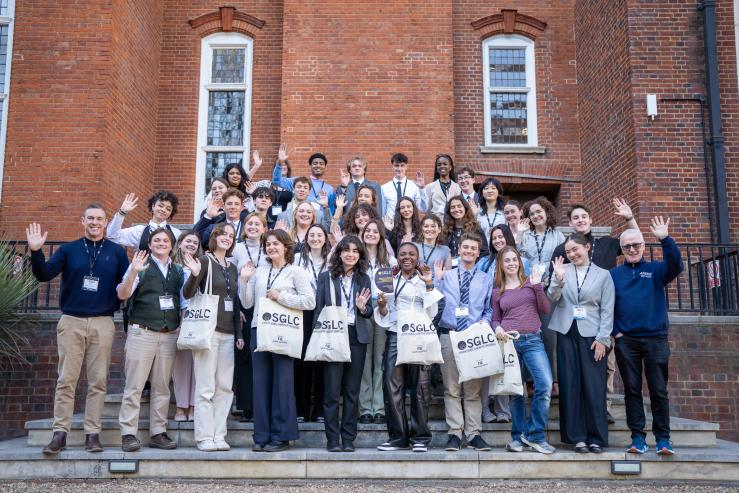
SGLC 2025 reminded us that leadership isn’t a title or a single moment. It’s a practice, a relationship, and – most of all – a responsibility.
This conference created something rare: an honest, inclusive and courageous community of learners and leaders.
And for everyone who was part of it, the impact will carry forward into classrooms, workplaces, communities, and conversations still to come.
Because leadership doesn’t begin with a spotlight. It begins with showing up.
And SGLC 2025 made that possible.
Stay connected and learn more: www.fie.org.uk/sglc
